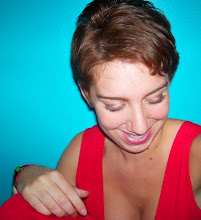It was a joke—this nickname. When studying and volunteering in Kolkata, I slowly picked up words in Bangla. Forever the entertainer, I was always trying to find words to bring comedy to the young women at the shelter where I volunteered. I learned that the word paagul meant ‘mad/crazy.’ One day at work, I called one of the girls paagul in jest. Everyone snickered as they said that paagli was the feminine of paagul. “Uhh…well then, tumi paagli!” Squealing at my new Bangla, they aptly rebutted with, ‘na—tumi paagli’ (no—you’re crazy!). After I said that we all are crazy, I became the leader, the didi—the big sister.

Working in that shelter inspired me enough to work on women’s empowerment as a career goal—and enough to tattoo this nickname on my wrist. The blue, soulful ink was aimed to be a reminder of my role as being the big sister to all I can: to help those in need, contribute positively to the world, love and support everyone in their challenges...even if I’m slightly silly and fun with it.
Trust me when I say that I forget more often than remember this to be my role. Especially in Bangladesh, various trials push me in a negative worldview causing selfish actions where I lose sight of being patient, charming and supportive. I’m still grappling with leaving school (one year graduation anniversary!) and facing the world on my own for the first time. I’m still forming opinions on all that surrounds me, tossing with truths and lies. And Lord, I chose to do it in a place outside all realms of normalcy!
So in this Fulbright experience, I wish I could have given more sisterly insanity. But the truth is that every didi has to take care of herself too. Often I found my spark submerged in the pollution of Dhaka, unable to find my heart’s compassion to be a paagli didi. There were a myriad of factors drowning me in self-pity and misdirected anger. While I came back to Bengal with the lofty expectations to deeply investigate women’s empowerment, it turned to be an extended (maybe endless) lesson of my personal and essential role in the world. I answered questions of who I am and who I want to be: what I love, what makes me feel good, what am I good at, what do I suck at, what can I improve, what can I accept?
I recognize the journey of self-discovery is crucial but a part of me wishes I could have incorporated my work more, helped a little more. But in the end, I think it’s best that I took the time to review my personality and morals—for what I believe is how I will act. Opinions can change from year to year as we mature with experiences, but the core of who you are shouldn’t. We should be eternally digging through the socially conditioned layers towards the heart, avoiding hypocrisy and superficial aesthetics. Self-awareness and self-love is the first step to being a true paagli didi.
I have a very special woman in my life. Enchanting, cheerful and forever radiating warmth, she is the most self-sacrificing woman I know. No, excuse me, than most people will ever know. She can remedy any problem of all who come to her with her networks, perseverance, compassion and intelligence. But in all that selfless beauty, she is drowning in others’ (and her own) constant and high demands—so much so that she isn’t taking care of herself. I admire and envy the truth of her but I am constantly reminding her how no one will receive help when she’s run into the ground.
Seeing her like this validates the importance of taking time for yourself, your body/mind/spirit before you can effectively give. Giving all the time will eventually leave you with nothing. I now have compassion for myself that I’ve been selfish in this journey—it’s needed. And I will compensate for it in due time.
I’ve accomplished a lot professionally and academically here: I’ve made contacts with several innovative (and no-so innovative) empowerment organizations and witnessed a range of progressive programs. Meeting these women firsthand and interviewing them in their village will remain the most crucial lessons of my professional career. Already I am shipping home reports, notes and books on my topic for future reference along with over 60 business cards of relevant employees in Bangladesh. But most importantly, I am dragging home a stronger Amanda: one who battled her own ill-temper, loneliness, doubt, and hatred—who came out still believing in the paagli didi inside her.
I am leaving Bangladesh taking more than I gave. But this relationship is far from over. I’ll make it up to her.





beautiful, Amanda. The emotions you're describing I know from my brief visit to Kolkata. I always felt that I was learning more than I could ever teach anyone. It changed my life, or at least my perspective on it and I wished I had understood it as well as you do.
ReplyDeleteI have been longing to go back to West Bengal for a while to try and give back a little of what it gave me. I haven't quite figured out how to do that yet...